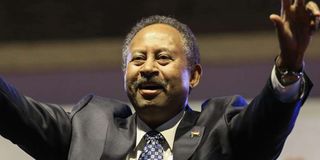Premium
Sudan reaches security deal with rebel groups

Sudanese Prime Minister Abdullah Hamdock.
What you need to know:
- South Sudan mediated the talks and President Salva Kiir’s advisor for security affairs, Tut Qalwak, was the key man behind the deal.
- Qalwak said the Comprehensive Peace Agreement with the rebel movements will take place on August 28, now that the key issues had already been agreed on.
- However, there were concerns that some groups which splintered from SPLM-North had stayed away from the deal, meaning they could still cause trouble.
Sudan’s transitional government on Monday reached a security deal with rebel groups under the Sudan People’s Liberation Movement-North(SPLM-N), inching closer to a united country following years of turmoil.
The rebel groups headed by Malik Agar had agreed to negotiate with the Transitional government of Prime Minister Abdalla Hamdok on power-sharing, but often differed on elements.
On Monday, officials announced SPLM-N had accepted an offer on security arrangements which means that the rebel fighters could gradually be integrated into the national army.
According to the deal, a mechanism to reform the country's military and security establishment will involve gradual creation of a single, professional, non-politicised national army “that represents the diversity of Sudan.”
The deal means the fighters who had spent years targeting the Sudanese army during the era of Omar al-Bashir will be integrated in the next 12 months or before Dr Hamdok’s transitional government elapses.
The head of Sudan’s negotiating delegation, Deputy Chairman of the Transitional Sovereignty Council Mohammad Hamdan Dagalo, said on Twitter: “We, today, agreed with the SPLA- North, led by Malik Agar, to sign the security arrangements agreement.”
“We are proceeding with the same determination and eagerness that we started in the peace talks to reach a permanent peace agreement that ends the suffering of our people and achieves security and stability."
Dagalo arrived Monday in Juba, South Sudan to participate in final talks on security arrangements for the two groups.
The two delegations in the talks had been headed by Major General Yassin Ibrahim, the Minister of Defence, for the transitional government; and SPLM - North Wing of Aqar headed by Yasser Arman.
The two sides should have signed the deal earlier, but security arrangements often remained a stumbling block with fighters demanding to be accommodated in the mainstream military as insurance from being targeted in future.
The Sudanese government and SPLM-N had already reached a "complete agreement" on security arrangements in the Blue Nile and Nuba Mountains. It detailed power-sharing structures for both national and regional levels, allowing the rebel groups to administer parts of the country as well as send representatives to the legislative assembly.
South Sudan mediated the talks and President Salva Kiir’s advisor for security affairs, Tut Qalwak, was the key man behind the deal.
Qalwak said the Comprehensive Peace Agreement with the rebel movements will take place on August 28, now that the key issues had already been agreed on.
However, there were concerns that some groups which splintered from SPLM-North had stayed away from the deal, meaning they could still cause trouble.
One wing is led by Abdel Aziz Al-Hilu and has been in direct opposition to the one led by Malik Agar.
The SPLM of al-Hilu has been fighting in the Nuba Mountains region, while Agar's wing battled in the Blue Nile, and it is widely popular among the people of the areas bordering the Ethiopian border.
Mediators said they were working to unify the groups ahead of the final peace agreement.





